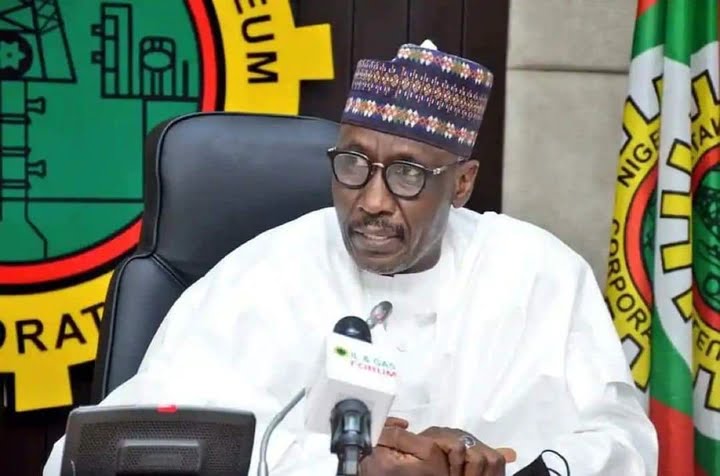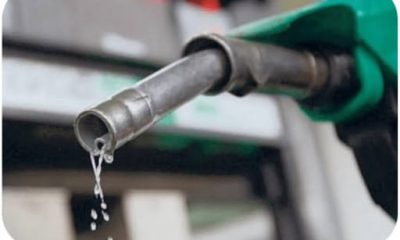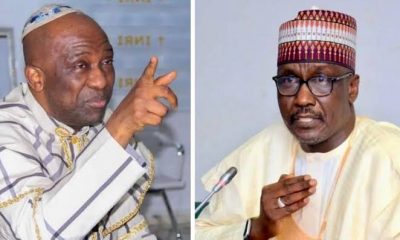Business
NNPC: Looking Beneath The Sustained Disinformation Charade

NNPC: Looking Beneath The Sustained Disinformation Charade
Sahara Weekly Reports That There is a steady and sustained dispensation of disinformation about Mele Kyari, the Group Chief Executive Officer of the Nigerian National Petroleum Company Limited. But, what did Kyari do to upset the apple cart? Is he a victim of his success? What could he have done to offend those attempting to obliterate his catalogue of achievements, and hanging him out to dry as an economic saboteur?
There is a frightening volume, velocity, and variety of campaigns of calumny against Mele Kyari, the Group Chief Executive Officer of the Nigerian National Petroleum Company Limited, NNPC.
In the past couple of weeks especially, a deluge of disingenuous disinformation, dilettante opinion articles and editorials, blog posts, and even tweets has been unleashed, underpinning the consensus that ‘Project Batter, Bruise, Bash, and Boot Out Kyari’ is in motion and has become the sun around which the daily to and fro of the masterminds revolves.
Given his successful turnaround records in the NNPC, it would have been easy to say that the masterminds are on a wild goose chase. However, a lie left unchallenged for too long may be taken as the Holy Grail.
The oil and gas industry is Nigeria’s cash cow and has churned out substantive and emergency billionaires. Before it transitioned into a limited liability company, the legacy corporation, NNPC, was regarded as the cash dispenser (Automated Teller Machine) of successive Nigerian governments.
Oil theft and pipeline vandalism were the order of the day with the resultant effect on production. Over the years, billions of naira went down the drain in the name of reviving the comatose refineries while the corporation was never known to remit revenue to the federation account.
Nigerians have not forgotten how former Governor of the Central Bank of Nigeria, Sanusi Lamido Sanusi, caused nationwide panic when he said that $20 billion in oil revenue had not been accounted for. It was the reign of flagrant impunity, opacity, and corruption.
Then came Mele Kyari, the University of Maiduguri-trained geologist. He superintended the corporation’s transition into a limited liability company and has been steering its ship adroitly since then.
In two years, the NNPC has grown from a loss-making position to a profit-making entity. The days of opacity are over with the introduction of the Transparency, Accountability, and Performance Excellence (TAPE) initiative, which occasioned the publication of the Monthly Financial and Operations Reports (MFOR), underscoring the corporation’s commitment to transparency, accountability, and open dialogue that are fundamental to building public trust.
The TAPE initiative, Kyari said, “places NNPC in a unique position globally as the only national oil company that publishes its financial and operations reports every month. Such transparency not only enhances accountability but also provides valuable insights into NNPC’s activities, performance, and strategic direction.”
Further, Kyari enlisted the NNPC l with the global transparency body, Extractive Industries Transparency Initiative (EITI), a Norway-based organisation that seeks to establish international standards for the good governance of oil, gas, and mineral resources while addressing the key governance issues in the extractive sectors.
In its recent global assessment of the NNPC, the EITI scored the corporation high for enhanced transparency and accountability standards, increased competitiveness, and concerted efforts in combating corruption in the global oil, gas, and mining sectors.
He also instituted a broad range of reforms including collaborating with security agencies and private security contractors while also establishing a control centre known as the Central Coordination, Data Integration, and Activation Control Room to provide surveillance of all the country’s oil and gas assets in the Niger Delta.
The NNPC Data Control Centre uses video visibility to monitor the pipeline networks in the Niger Delta where more than 90 per cent of the country’s crude is explored.
Kyari has vowed to get the Kaduna, Port Harcourt, and Warri refineries working optimally again, promising that Nigeria will become a net exporter of petroleum when they are rejuvenated. He has also led the charge in reducing the impact of the fuel subsidy removal on Nigerians with the implementation of the Presidential Compressed Natural Gas (CNG) initiatives launched by President Tinubu to provide cheaper alternative fuel to motorists, stimulate the economy, and reduce carbon footprints.
Despite this catalogue of achievements, Kyari continues to be blackmailed, vilified, and scapegoated by the oil mafia who want the old days of flagrant impunity and milking of Nigeria’s commonwealth to return.
Nigeria’s economy is slowly rebounding after tailspinning into an abyss due to bad management. But the recovery pace has been further slowed down by the forces that want to hang Kyari out to dry.
He has been accused of sabotaging the Dangote Refinery by not meeting up with its crude oil supplies. But he denied the allegation saying the law is clear on domestic crude oil supply obligations and providing for local refineries.
“(The) Refining business is a straightforward business. You must secure (a source for) your feedstock and you must find a market. This is basic and this determines what happens in any refinery anywhere in the world. That is the business of refining. We have done nothing to sabotage any domestic refinery,” Kyari stated.
While appearing before an ad hoc senate committee on August 7, Kyari declared that the attacks were deliberate and calculated to create the impression that the NNPC and its leadership are creating economic sabotage in the country, saying, “And all of us see what is happening in the media – targeted personal attack on my person, on the institution, and we all know how this works.”
On the alleged importation of sub-standard products into the country, Kyari said the NNPC Limited has nothing to do with that as the relevant regulatory agencies will, by law, not allow any sub-standard product into the country.
The most recent attack came from the regional newspaper, Daily Trust, which jumped on the obnoxious bandwagon with the editorial, last Monday, “NNPC Must Go,” asking rather astonishingly, “Is the NNPC a state-owned enterprise, a public service provider like a university or yet, a private company like Innoson Motors? Or is the NNPC all three at once?” Even a kindergarten pupil knows that after about 45 years of operating as a fully-owned government company, the NNPC was transformed into a limited liability company in July 2022 as the only entity licensed to operate in the country’s petroleum industry. And, it has been operating as such for the past two years, and profitably and transparently too.
It is one of three things – either Kyari is a victim of his success, a soft target for the prevailing economic hardship, or he is merely a personification of the aphorism; uneasy lies the head that wears the crown. Whatever it is, the damaging disinformation needs to stop immediately in the interest of Nigeria.
SOURCE: pmexpressng.com
Business
Nigeria’s Inflation Drops to 15.10% as NBS Reports Deflationary Trend

Nigeria’s headline inflation rate declined to 15.10 per cent in January 2026, marking a significant drop from 27.61 per cent recorded in January 2025, according to the latest Consumer Price Index (CPI) report released by the National Bureau of Statistics.
The report also showed that month-on-month inflation recorded a deflationary trend of –2.88 per cent, representing a 3.42 percentage-point decrease compared to December 2025. Analysts say the development signals easing price pressures across key sectors of the economy.
Food inflation stood at 8.89 per cent year-on-year, down from 29.63 per cent in January 2025. On a month-on-month basis, food prices declined by 6.02 per cent, reflecting lower costs in several staple commodities.
The data suggests a sustained downward trajectory in inflation over the past 12 months, pointing to improving macroeconomic stability.
The administration of President Bola Ahmed Tinubu has consistently attributed recent economic adjustments to ongoing fiscal and monetary reforms aimed at stabilising prices, boosting agricultural output, and strengthening domestic supply chains.
Economic analysts note that while the latest figures indicate progress, sustaining the downward trend will depend on continued policy discipline, exchange rate stability, and improvements in food production and distribution.
The January report provides one of the clearest indications yet that inflationary pressures, which surged in early 2025, may be moderating.
Bank
Alpha Morgan to Host 19th Economic Review Webinar

Alpha Morgan to Host 19th Economic Review Webinar
In an economy shaped by constant shifts, the edge often belongs to those with the right information.
On Wednesday, February 25, 2026, Alpha Morgan Bank will host the 19th edition of its Economic Review Webinar, a high-level thought leadership session designed to equip businesses, investors, and individuals with timely financial and economic insight.
The session, which will hold live on Zoom at 10:00am WAT and will feature economist Bismarck Rewane, who will examine the key signals influencing Nigeria’s economic direction in 2026, including policy trends, market movements, and global developments shaping the local landscape.
With a consistent track record of delivering clarity in uncertain times, the Alpha Morgan Economic Review continues to provide practical context for decision-making in a dynamic environment.
Registration for the 19th Alpha Morgan Economic Review is free and can be completed via https://bit.ly/registeramerseries19
It is a bi-monthly platform that is open to the public and is held virtually.
Visit www.alphamorganbank to know more.
Business
GTBank Launches Quick Airtime Loan at 2.95%

GTBank Launches Quick Airtime Loan at 2.95%
Guaranty Trust Bank Ltd (GTBank), the flagship banking franchise of GTCO Plc, Africa’s leading financial services group, today announced the launch of Quick Airtime Loan, an innovative digital solution that gives customers instant access to airtime when they run out of call credit and have limited funds in their bank accounts, ensuring customers can stay connected when it matters most.
In today’s always-on world, running out of airtime is more than a minor inconvenience. It can mean missed opportunities, disrupted plans, and lost connections, often at the very moment when funds are tight, and options are limited. Quick Airtime Loan was created to solve this problem, offering customers instant access to airtime on credit, directly from their bank. With Quick Airtime Loan, eligible GTBank customers can access from ₦100 and up to ₦10,000 by dialing *737*90#. Available across all major mobile networks in Nigeria, the service will soon expand to include data loans, further strengthening its proposition as a reliable on-demand platform.
For years, the airtime credit market has been dominated by Telcos, where charges for this service are at 15%. GTBank is now changing the narrative by offering a customer-centric, bank-led digital alternative priced at 2.95%. Built on transparency, convenience and affordability, Quick Airtime Loan has the potential to broaden access to airtime, deliver meaningful cost savings for millions of Nigerians, and redefine how financial services show up in everyday life, not just in banking moments.
Commenting on the product launch, Miriam Olusanya, Managing Director of Guaranty Trust Bank Ltd, said: “Quick Airtime Loan reflects GTBank’s continued focus on delivering digital solutions that are relevant, accessible, and built around real customer needs. The solution underscores the power of a connected financial ecosystem, combining GTBank’s digital reach and lending expertise with the capabilities of HabariPay to deliver a smooth, end-to-end experience. By leveraging unique strengths across the Group, we are able to accelerate innovation, strengthen execution, and deliver a more integrated customer experience across all our service channels.”
Importantly, Quick Airtime Loan highlights GTCO’s evolution as a fully diversified financial services group. Leveraging HabariPay’s Squad, the solution reinforces the Group’s ecosystem proposition by bringing together banking, payment technology, and digital channels to deliver intuitive, one-stop experiences for customers.
With this new product launch, Guaranty Trust Bank is extending its legacy of pioneering digital-first solutions that have redefined customer access to financial services across the industry, building on the proven strength of its widely adopted QuickCredit offering and the convenience of the Bank’s iconic *737# USSD Banking platform.
About Guaranty Trust Bank
Guaranty Trust Bank (GTBank) is the flagship banking franchise of GTCO Plc, a leading financial services group with a strong presence across Africa and the United Kingdom. The Bank is widely recognized for its leadership in digital banking, customer experience, and innovative financial solutions that deliver value to individuals, businesses, and communities.
About HabariPay
HabariPay is the payments fintech subsidiary of GTCO Plc, focused on enabling fast, secure, and accessible digital payments for individuals and businesses. By integrating payments and digital technology, HabariPay supports innovative services that make everyday financial interactions simpler and more seamless.
Enquiries:
GTCO
Group Corporate Communication
[email protected]
+234-1-2715227
www.gtcoplc.com
-

 celebrity radar - gossips6 months ago
celebrity radar - gossips6 months agoWhy Babangida’s Hilltop Home Became Nigeria’s Political “Mecca”
-

 society6 months ago
society6 months agoPower is a Loan, Not a Possession: The Sacred Duty of Planting People
-

 society5 months ago
society5 months agoReligion: Africa’s Oldest Weapon of Enslavement and the Forgotten Truth
-

 news6 months ago
news6 months agoTHE APPOINTMENT OF WASIU AYINDE BY THE FEDERAL GOVERNMENT AS AN AMBASSADOR SOUNDS EMBARRASSING









